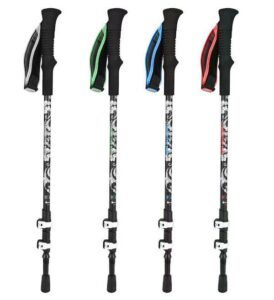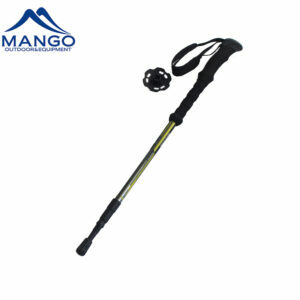How Long Should My Trekking Pole Be for My Height?
Trekking poles are essential companions for hikers, providing stability and support on various terrains. Finding the right length for your trekking pole is crucial for optimal performance and comfort during your outdoor adventures. The correlation between your height and the length of your trekking pole plays a significant role in ensuring a pleasant hiking experience.
The Importance of Trekking Pole Length
Choosing the Appropriate Length
Selecting the correct length for your trekking pole is not a one-size-fits-all situation. Your height is a primary factor that determines the suitable length. An improperly sized pole can lead to discomfort and inefficiency during your hike. The right length enhances your posture, balance, and overall stability.
Effects on Posture
Trekking poles that are too short or too long can disrupt your natural posture and walking rhythm. Poles that are too short might cause you to bend over more than necessary, leading to back strain. Conversely, overly long poles can result in awkward arm positioning, causing discomfort in the shoulders and wrists.
Measuring for the Perfect Fit
Step-by-Step Guide
Stand Upright: Wear your hiking shoes and stand naturally upright on a flat surface.
Hold the Pole: Grasp the trekking pole just below the grip, allowing your forearm to be parallel to the ground.
Adjust Length: Most trekking poles have adjustable sections. Modify the length until your elbow forms a 90-degree angle when the pole tip touches the ground.
Test and Refine: Take a few steps with the poles to assess comfort. If your arm angle is less than 90 degrees, shorten the pole; if it’s more, lengthen it.
Consider Terrain
Remember that the ideal pole length can vary based on the terrain you plan to tackle. For uphill climbs, you might prefer slightly shorter poles to provide more power. Conversely, when descending, longer poles can offer better stability. Adapt the length according to the specific challenges of your hike.
Addressing Common Concerns
Can I Use Fixed-Length Poles?
While adjustable trekking poles offer more flexibility, fixed-length poles can work well if you find the perfect match for your height. Just ensure the fixed length corresponds to your measured size.
What About Different Activities?
The appropriate pole length can differ based on the activity. For hiking, follow the elbow angle guideline. However, for trail running, you might prefer slightly shorter poles to accommodate the faster pace.
Are Shock-Absorbing Poles Relevant?
Shock-absorbing poles are designed to reduce impact on your joints. While they can be beneficial, ensure that the pole length is still suitable for your height. The shock-absorbing feature should complement the correct sizing.
Adult Anti-shock Trekking Pole for Hiking
Conclusion
The right trekking pole length significantly enhances your hiking experience. Your height serves as a reliable guide in determining the appropriate pole length, ensuring that your posture and stability remain intact throughout your journey. Remember to consider the specific terrain and activity to make slight adjustments as needed. By following these guidelines, you’ll be well-equipped to choose trekking poles that perfectly align with your outdoor aspirations.
Questions and Answers
Q: Can I use someone else’s trekking poles?
A: While it’s possible, it’s recommended to find poles that suit your height and posture. Using improperly sized poles can lead to discomfort and potential injury.
Q: Should both poles be the same length?
A: Yes, for optimal balance and stability, both poles should be adjusted to the same length based on your measurements.
Q: How do I maintain trekking poles?
A: Regularly clean the poles to remove dirt and debris. Check the locking mechanisms for wear and ensure that the tips and baskets are in good condition.
Q: Can I use trekking poles if I’m not very tall?
A: Absolutely, trekking poles are beneficial regardless of your height. Adjust the length accordingly to match your stature for the best results.
Q: Should I extend the poles fully when going downhill?
A: It’s a good practice to slightly shorten the poles when descending steep slopes. This adjustment can provide better balance and control.
159
0
0





Comments
All Comments (0)